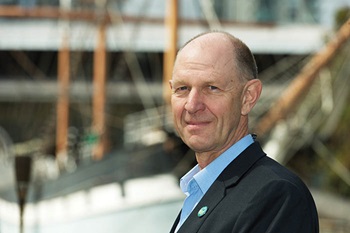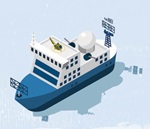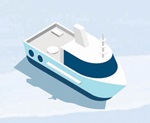With four decades of experience in the fishing industry, CEO of Austral Fisheries David Carter says the wild harvest seafood sector needs to keep the long game in mind if it wants to remain relevant as a respected and responsible food provider
By David Carter, CEO Austral Fisheries Pty Ltd
 David Carter, CEO Austral Fisheries Pty Ltd
David Carter, CEO Austral Fisheries Pty Ltd Five-year planning is useful for a business, but gazing out to 30 years’ time can help give context to that planning. Thirty years is less than the span of my career. From our position today, it is also when the global population is expected to reach 9.5 billion. And a lot needs to happen by then.
Fuelling up
As an industry, I think we need to aim for zero net fossil fuel usage. If we do not, I think it is going to be too hard to maintain a competitive market position and we will lose our social licence.
Right now at Austral, our focus is on making the best use of every litre of diesel we do burn. The next step is finding what is going to power our boats beyond diesel.
We have a new boat being built in Norway, the Cape Arkona, which has a hybrid capability that includes regenerative braking winches that top up power into a battery system. But we still have to burn diesel.
It is hard to see what the future of fuel is going to look like, but it has to change; we have to wean ourselves off fossil fuels. I do not really think battery power is going to work, but I have a quiet itch about hydrogen and how we might be able to work with that. We have a few hydrogen-related projects on the go, and want to collaborate with people trying to make a difference in this space.
Fishing operations
I think there also needs to be greater use of autonomous systems in fishing, operating boats and handling catches. We need to catch fish more efficiently and cheaply, with more transparency in fishing and along the supply chain.

My idea for prawn fishing is to have an autonomous underwater vehicle that, using a vision system and machine learning, cruises around and gulps up prawns selectively: beautiful quality, no bycatch.
This idea is not so off the wall. With remote sensing, satellites and underwater glider systems, autonomous underwater vehicles already do all sorts of stuff. We have vision systems that allow us to count fish as they come over the rails and pick out species as the fish move along conveyor belts.
We can also build into this greater transparency for consumers by using blockchain technology along the supply chain. Customers increasingly want to know where their product is coming from. They want to understand its exact provenance and related information, such as about bycatch. We have done a lot of work reducing bycatch in the prawn fishery, but in 20 years current practices simply will not be up to scratch. We need to do better.
Autonomy, technology, traceability – they all come together to transform fishing operations.
Seafood customers
Keeping Australians favourably disposed to seafood is going to be harder, but is critical if we are to maintain access to resources. The narrative we build about our fisheries is going to be important.
It is hard to imagine that food security will be an issue for Australia. It is just not on our radar because we are a net exporter of food, although it clearly is an issue for smart and strategic countries like China.
We also have a generation of 20 year olds optingto be vegetarians for ethical reasons and people are generally eating less and less animal protein. There are new meatless meats and shrimpless shrimp and all the trickery that goes with that.
But, I think 30 years out, there will still be markets that are keen on having the real deal, a real piece of fish, as God intended. For me, that means an increasing focus on a premium experience – smaller portions at a higher price.
I like the idea of animal protein as a garnish to vegetables in a diet that is good for us and good for the planet. Wild seafood is a fantastic product, a high-quality protein with good oils and essential trace elements, no fresh water, no antibiotics, low emissions, all of which combine to make our bodies sing. And if you do eat animal protein, it is much better to eat wild seafood than red meat for both health and environmental reasons.
Climate moves
For many years, we have had a pretty good handle on the science about how we harvest and keep fisheries sustainable. But we have to be vigilant about the impacts of climate change. The oceans are changing and we need to think about possible shifts in the range of species available. This may result in some fisheries being winners and others losers.

At a corporate level, climate is now officially a ‘foreseeable corporate risk’. Directors and executives who do not see it as such can be held responsible for their failure to respond.
Different parts of the industry have more fat in the system, more capacity to identify the risks, take action and survive these challenges.
There are going to be casualties, particularly smaller inshore fisheries, although that is not just about climate. Smaller businesses do not have the resources to mount a counter-argument against competing users in growing population centres. Governments are also making expedient decisions and chasing the recreational fishing vote.
Market opportunity
Climate is the threat, but we also see it as an opportunity to distinguish ourselves. For the many people who think that climate change is real and who want to do something about it, we give them
a choice. We are saying: “This is important to us, and if it is important to you, support us with your spend”.
If you can get the branding right and build a following, you are in with a chance. You need a brand, as well as trust and transparency. As a producer, it is an uncomfortable position to be in
if you are relying on relationships with supermarkets to sell unbranded seafood.
We deal with importers all over the world and these customers recognise the value in long-term relationships. But supermarkets are very transactional in their approach; it is most often about the best price right now, not the relationship.
I think the demand for wild seafood will endure, but it is definitely under pressure.
Moving forward, making a buck will continue to be difficult – finding good people and keeping them safe, having markets sorted out, taming supermarkets, building a brand, building value, and explaining yourself to customers and stakeholders are all challenges we will face. None of that is going to get any easier.





